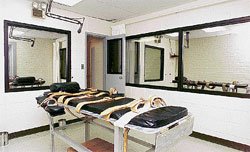
When I was a reserve delegate to the UMC’s General Conference in 2004, there were two things I remember about Sandra Lackore’s report to the General Conference (she is the treasurer of the General Council of Finance & Administration). The first was that the United Methodist Church has an infrastructure it can no longer afford. The second one was that the Episcopal Fund was drying up, and that each jurisdiction needed to drop one bishop. Well, no jurisdiction did what was suggested. Expenses for bishops far exceeded projections, mainly because of health care benefits. We were warned that NOT reducing the number of bishops would result in a 30% increase in 2008. This is on top of a $15 million unfunded liability. Apportionment income dropped from 94% in 2000 to 90.2% in 2003. This does NOT paint a pretty picture. (source: gcfa.org)
Let me be the first to say that the job of bishops and district superintendents is a thankless and difficult one. Having said that, I was asked by a church member once, “What does a bishop do?” I told them the traditional role of a bishop was to baptize and anoint with oil, and to shepherd the flock. When asked if they do that now, I had to tell them, “Not very often.” Today, bishops function largely in an administrative role. I found this report by Bishop Peter Weaver:
So, what does a Bishop do? My report for 2001 shows the following: 101 churches visited; 56 days spent in cabinet meetings and over 175 changes in appointments made; 40 days in general church meetings; 22 days in college or council of bishops’ meetings; 33 annual conference meetings; 16 days for annual conference sessions; 11 district days; 28 special clergy events; 18 special laity events; 19 meetings with conference-related institutions; 14 ecumenical events; 22 meetings with community leaders; the equivalent of 57 days driving (averaging 50 mph for 8 hours a day) going to churches and gatherings in our Conferences (22,723 miles). Additionally, there have been scores of appointments kept and hundreds of letters sent. - "So What Does a Bishop Do?" by Bishop Peter D. Weaver
Bishops evidently have to "meet" a lot.
Are they leaders? Some have observed, most notably Lyle Schaller, that we’re not really sure if we
want our bishops to be leaders. In the case of my conference, we share a bishop with another annual conference – a huge responsibility. Can we honestly ask our bishop to be responsible for everything that does or doesn’t happen, good or bad? Can we honestly hold our bishop responsible for the decline in membership of the annual conference I serve?
What about the UMC bishops in general? Schaller’s rather rude response (his words, not mine) is that if the Roman Catholic Church can’t hold its bishops responsible for cover-ups of sexual abuse amongst their priests, how in the heck can the United Methodist Church hold its bishops responsible for membership loss, the loss of doctrinal integrity, or the loss of denominational identity? It’s a good point. The ongoing skirmish between the Council of Bishops and the Judicial Council and the smaller skirmishes in recent years within the Council of Bishops give some cause for concern. Who's watching the store? Is this leadership, or just a power skirmish?
Add to all of this our country’s own individualism and distrust of central authority, and I think the UMC may face a very real crisis (one of many, I suspect). If people
are unclear about the role of the episcopacysee no sense of unity in a denomination that is (at least in theory) bound in covenant by a Book of Discipline that the bishops are supposed to observe and use in their oversight over those they shepherd, andrealize that we’re running out of money to support the episcopacy,… we may find that we don’t really need bishops.
Before you accuse me of being a heretic, know that the British Methodists have gotten along without bishops all these years. John Wesley was not at all happy with Francis Asbury calling himself a bishop, and we credit Wesley with birthing Methodism!
I actually don’t think we need to get rid of bishops. But the present role is far from effective or even traditional. Electing bishops at Jurisdictional Conferences doesn’t really represent the whole Church – and considering that jurisdictions were born of racism is a painful reminder of where we ought not to be in this day and age. I think we should elect them at General Conference.
The roles of bishop and district superintendent are in desperate need of an overhaul. To be honest, in practice, our bishops are really archbishops, and our D.S.'s are bishops - there's no way that you can really "bish" 100,000+ folks and be effective at it. An excellent book on all of these matters is
Episcopacy in the Methodist Tradition, by Richey and Frank.
It would make sense to do the overhaul rather quickly, before we find that we simply can’t afford the episcopacy anymore.
Pax,
Sky+








